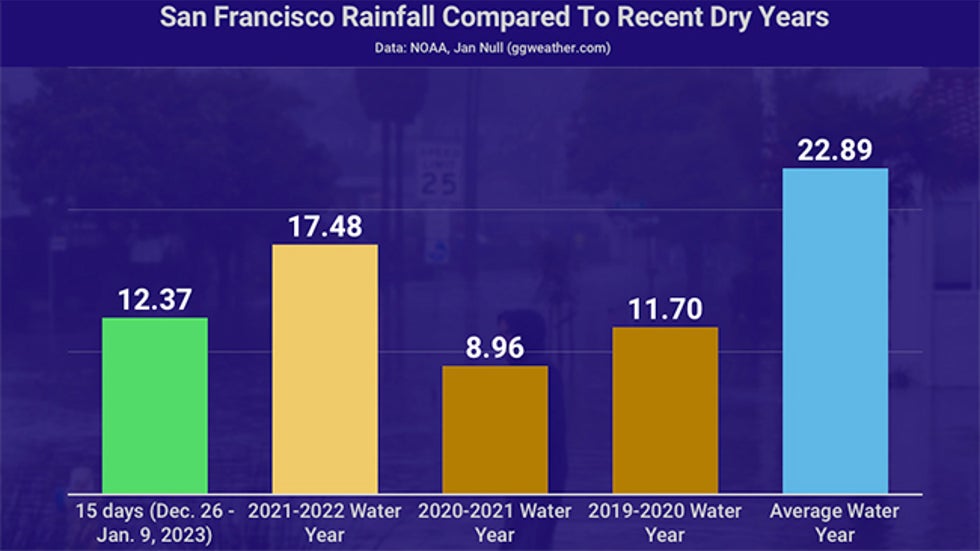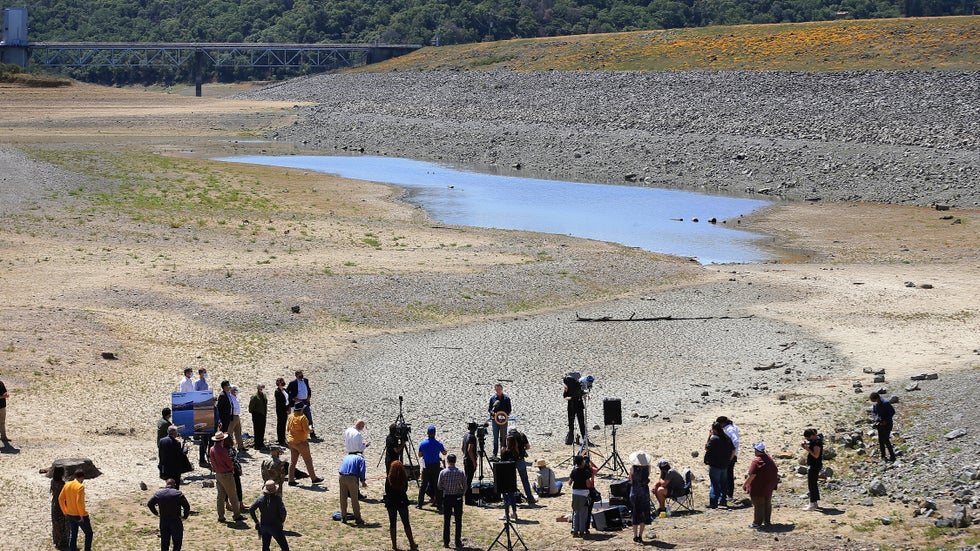Jonathan Erdman
The recent siege of California storms has dumped more rain in parts of the state than in entire recent years in what has been a rather stunning turn of events in the drought-stricken area.
At least five separate rounds of rain and mountain snow have drenched the Golden State since the day after Christmas.
The resulting rainfall totals from these storms have been staggering and produced damaging flooding and mudslides
For example, downtown San Francisco has picked up over 12 inches of rain from Dec. 26 through Jan. 9.
That's the city's wettest 15-day stretch in over 156 years, according to Bay Area meteorologist Jan Null.
It's over half their average annual rainfall (22.89 inches), and also more rain than during the 12-month water years in 2019-20 and 2020-21. A water year - from July through June - is how hydrologists and water managers in California organize the year around the state's wet season.
 Rainfall totals in Downtown San Francisco from Dec. 26 through Jan. 9, 2023 (left, green bar) compared to totals over the past three "water years" dating to 2019. A water year runs from July through June of the following year.
Rainfall totals in Downtown San Francisco from Dec. 26 through Jan. 9, 2023 (left, green bar) compared to totals over the past three "water years" dating to 2019. A water year runs from July through June of the following year.A Different Story The Past Few Years
December through February are typically the wettest months in California, but that hasn't been the case the past several winters.
Last January tied for the second driest January on record in California.
That was after the state's driest water year on record from July 2020 through June 2021. Spring 2021 was so warm and dry that the Sierra snowpack melted two months earlier than usual in late May before the snowmelt could recharge the state's reservoirs.
 California Gov. Gavin Newsom holds a news conference in the parched basin of Lake Mendocino in Ukiah, Calif., Wednesday, April 21, 2021, where he announced he would proclaim a drought emergency for Mendocino and Sonoma counties.
California Gov. Gavin Newsom holds a news conference in the parched basin of Lake Mendocino in Ukiah, Calif., Wednesday, April 21, 2021, where he announced he would proclaim a drought emergency for Mendocino and Sonoma counties.Another dry rainy season from fall 2019 into spring 2020 left the state's snowpack in sorry shape by May 2020 and kicked off the current multi-year drought.
A Drought Denter
This storm siege has boosted some state reservoirs above levels typical for this time of year.
Sierra snowpack is not only well above average for mid-January, but is also nearing or even topping the typical value for early April. That's when the snowpack typically reaches its peak before it begins to melt and recharge the state's reservoirs through summer.
A somewhat wet pattern needs to last through spring in order to keep chipping away at the long-term drought. California can't hope to erase the drought if the state lurches back to the persistently dry pattern from the past few winters and springs.
Longer-range models suggest a drier pattern may finally set in for a while by the final week of January. That would provide at least a break for the flood-weary state. But it's not clear how long that will last.
NOAA's precipitation outlook through March calls for below-average precipitation in Southern California, but mixed signals on whether the first three months of 2023 will be wet or dry in Northern California.
It remains to be seen whether this impressive two-week-plus storm parade is the beginning of the end of California's multi-year drought, or whether it's just a temporary drought dent.
The Weather Company’s primary journalistic mission is to report on breaking weather news, the environment and the importance of science to our lives. This story does not necessarily represent the position of our parent company, IBM.
The Weather Company’s primary journalistic mission is to report on breaking weather news, the environment and the importance of science to our lives. This story does not necessarily represent the position of our parent company, IBM.

No comments:
Post a Comment